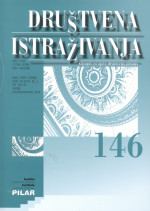The Role of Personality Traits in the Choice and Use of Language Learning Strategies
The Role of Personality Traits in the Choice and Use of Language Learning Strategies
Author(s): Jelisaveta Šafranj, Aleksandra Gojkov-RajićSubject(s): Foreign languages learning, Higher Education , Cognitive Psychology, Personality Psychology
Published by: Institut društvenih znanosti Ivo Pilar
Keywords: language learning strategies; SILL; personality traits; Big Five Model; university students;
Summary/Abstract: The paper aims to investigate the relationships between foreign language learning strategies (FLLS) and personality traits among students of education and engineering sciences. Quantitative survey of self-report questionnaire was used to evaluate learning strategies and individual personality traits. Pearson's correlation coefficients were calculated and six linear regressions were conducted to test the predictive role of personality dimensions when language learning strategies were used as a criterion. The findings propose that students with different personality traits have different preferences when it comes to learning strategies. Two out of five personality traits from this study seem to have an important role in the prediction of the FLLS type used. While low Conscientiousness was predictive of more frequent usage of Cognitive and Compensation strategies, high Intellect was predictive of more frequent usage of Cognitive and Metacognitive strategies. The study points out the significance of managing students by meeting their personal differences in choosing learning strategies, and not by relying on the personality stereotypes that are predominant. The obtained results can help teachers to select appropriate learning strategies that match students' different personality types.
Journal: Društvena istraživanja - Časopis za opća društvena pitanja
- Issue Year: 28/2019
- Issue No: 4
- Page Range: 691-704
- Page Count: 19
- Language: English

